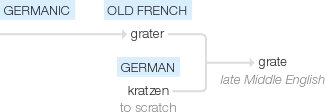Grate
late Middle English: from Old French grater, of Germanic origin; related to German kratzen ‘to scratch’.
wiktionary
From Middle English grate, from a Medieval Latin grāta, from a Latin word for a hurdle; or Italian grata, from Latin cratis.
From Middle English graten, from Old French grater(“to scrape”) ( > French gratter), from Frankish *krattōn, from Proto-Germanic *krattōną. Cognate with Old High German krazzon [1] ( > German kratzen(“to scrawl”) > Danish kradse), Icelandic krassa(“to scrawl”) [2] and Danish kratte.
From Latin grātus(“agreeable”).
grate ( comparative more grate, superlative most grate)
etymonline
grate (n.)
late 14c., "grill for cooking;" early 15c., "iron bars or cagework across a door or window," from Anglo-Latin (mid-14c.), from Old French grate or directly from Medieval Latin grata "a grating, lattice," from Latin cratis "wickerwork, hurdle" (see hurdle (n.)). As a verb meaning "to fit with a grate," from mid-15c. Related: Grated; grating.
grate (v.)
"to scrape, rub," late 14c. (implied in grated), from Old French grater "to scrape, scratch (out or off); erase; destroy, pull down" (Modern French gratter), from Frankish *kratton, from Proto-Germanic *krattojan (source also of Old High German krazzon "to scratch, scrape," German kratzen "to scratch," Swedish kratta, Danish kratte "to rake, scrape"), probably of imitative origin. Senses of "sound harshly," and "annoy" are mid-16c. Italian grattare also is from Germanic. Related: Grated; grating.
